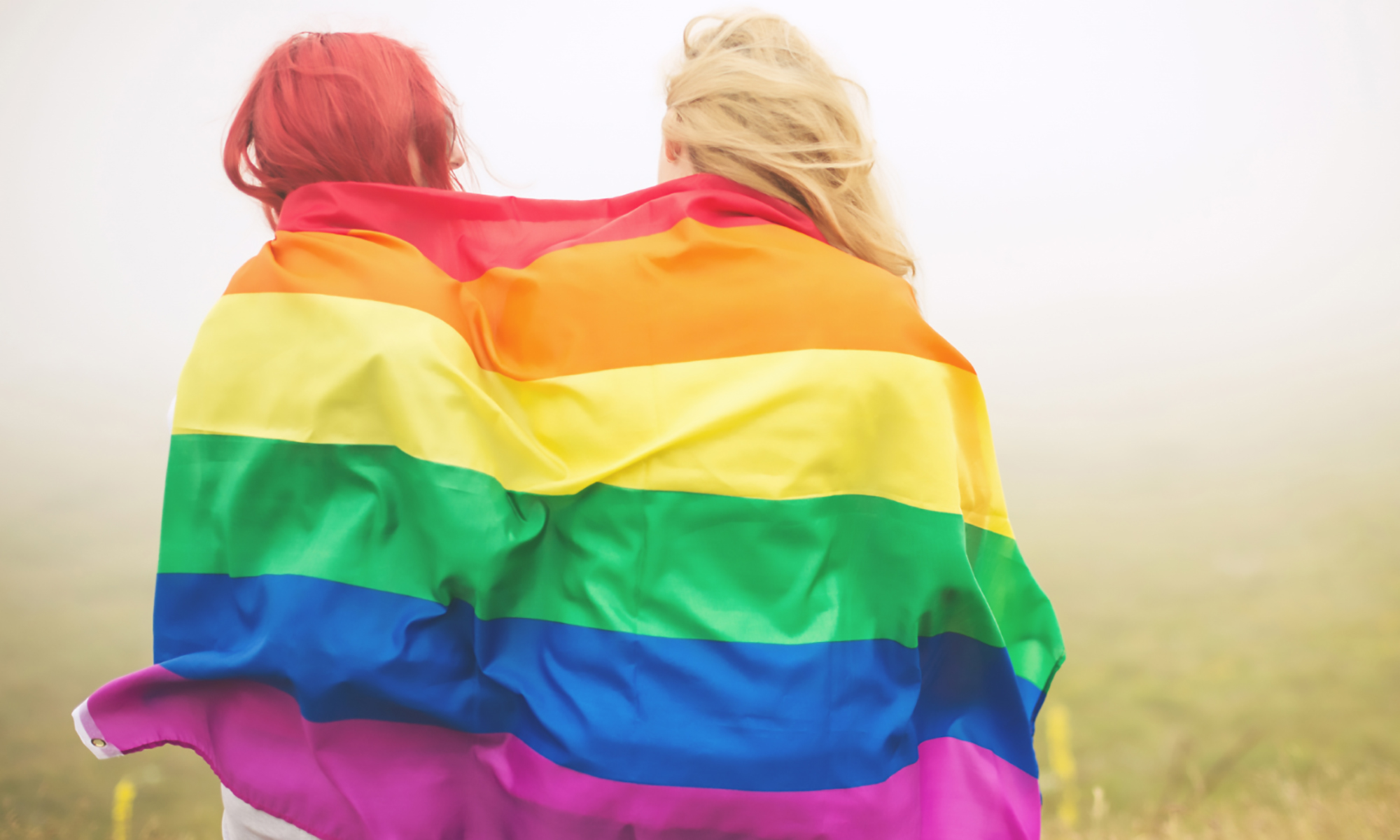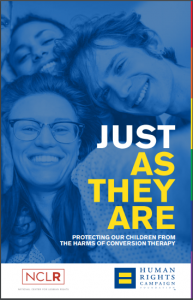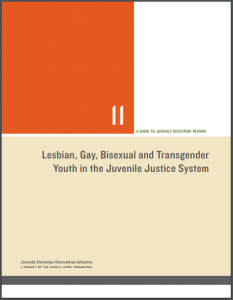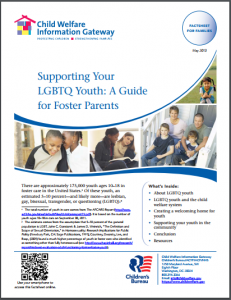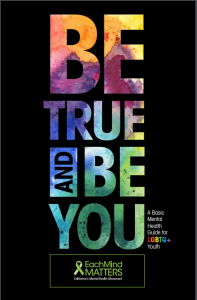 Written to youth and young adults to provide an overview of sexual orientation, gender identity and expression, coming out, LGBTQ+ and mental health, self-care, mental health services, and rights.
Written to youth and young adults to provide an overview of sexual orientation, gender identity and expression, coming out, LGBTQ+ and mental health, self-care, mental health services, and rights.
Critical Issues and LGBT-Two Spirit Populations: Highlights from the HONOR Project Study
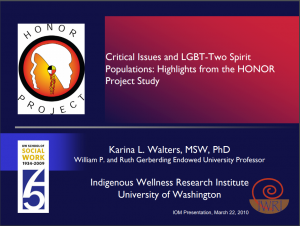 A health survey of Two-Spirit Native Americans designed to (a) test a theoretically driven stress and coping model among 447 twospirit American Indians via a structured survey; (b) design and test the feasibility of various peer-driven sampling recruitment methodologies to produce a national representative sample; and (c) conduct a qualitative study with 65 leaders to identify major strengths and coping strategies in this population.
A health survey of Two-Spirit Native Americans designed to (a) test a theoretically driven stress and coping model among 447 twospirit American Indians via a structured survey; (b) design and test the feasibility of various peer-driven sampling recruitment methodologies to produce a national representative sample; and (c) conduct a qualitative study with 65 leaders to identify major strengths and coping strategies in this population.
Report by the Indigenous Wellness Research Institute at the University of Washington, 2010.
Just as They Are: Protecting Our Children from the Harms of Conversion Therapy
Lesbian, gay, and bisexual (LGB) youth within in welfare: Prevalence, risk and outcomes
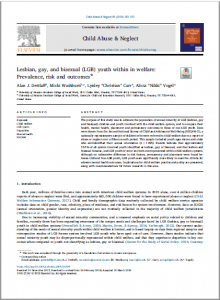 The purpose of this study was to estimate the population of sexual minority or LGB (lesbian, gay and bisexual) children and youth involved with the child welfare system, and to compare their health, mental health, placement and permanency outcomes to those of non-LGB youth. Data were drawn from the Second National Survey of Child and Adolescent Well-Being (NSCAW-II), a nationally representative sample of children who were referred to child welfare due to a report of abuse or neglect over a fifteen month period. Results indicate that approximately 15.5% of all system involved youth identified as lesbian, gay or bisexual, and that lesbian and bisexual females, and LGB youth of color are both overrepresented within child welfare systems. Although no substantive difference in risk factors, permanency and placement were found between LGB and Non-LGB youth, LGB youth were significantly more likely to meet the criteria for adverse mental health outcomes. Implications for child welfare practice and policy are presented, along with recommendations for future research in this area.
The purpose of this study was to estimate the population of sexual minority or LGB (lesbian, gay and bisexual) children and youth involved with the child welfare system, and to compare their health, mental health, placement and permanency outcomes to those of non-LGB youth. Data were drawn from the Second National Survey of Child and Adolescent Well-Being (NSCAW-II), a nationally representative sample of children who were referred to child welfare due to a report of abuse or neglect over a fifteen month period. Results indicate that approximately 15.5% of all system involved youth identified as lesbian, gay or bisexual, and that lesbian and bisexual females, and LGB youth of color are both overrepresented within child welfare systems. Although no substantive difference in risk factors, permanency and placement were found between LGB and Non-LGB youth, LGB youth were significantly more likely to meet the criteria for adverse mental health outcomes. Implications for child welfare practice and policy are presented, along with recommendations for future research in this area.
Lesbian, Gay, Bisexual and Transgender Youth in the Juvenile Justice System: A Guide to Juvenile Detention Reform
Mental Health of Transgender Children Who Are Supported in Their Identities
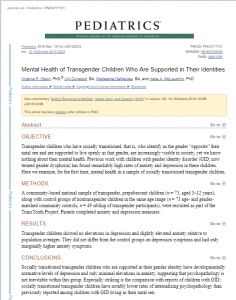 Transgender children who have socially transitioned, that is, who identify as the gender “opposite” their natal sex and are supported to live openly as that gender, are increasingly visible in society, yet we know nothing about their mental health. Previous work with children with gender identity disorder (GID; now termed gender dysphoria) has found remarkably high rates of anxiety and depression in these children. Here we examine, for the first time, mental health in a sample of socially transitioned transgender children. Results demonstrate that socially transitioned transgender children who are supported in their gender identity have developmentally normative levels of depression and only minimal elevations in anxiety, suggesting that psychopathology is not inevitable within this group. Especially striking is the comparison with reports of children with GID; socially transitioned transgender children have notably lower rates of internalizing psychopathology than previously reported among children with GID living as their natal sex.
Transgender children who have socially transitioned, that is, who identify as the gender “opposite” their natal sex and are supported to live openly as that gender, are increasingly visible in society, yet we know nothing about their mental health. Previous work with children with gender identity disorder (GID; now termed gender dysphoria) has found remarkably high rates of anxiety and depression in these children. Here we examine, for the first time, mental health in a sample of socially transitioned transgender children. Results demonstrate that socially transitioned transgender children who are supported in their gender identity have developmentally normative levels of depression and only minimal elevations in anxiety, suggesting that psychopathology is not inevitable within this group. Especially striking is the comparison with reports of children with GID; socially transitioned transgender children have notably lower rates of internalizing psychopathology than previously reported among children with GID living as their natal sex.
Sharing Our Lived Experiences: Eight Tips for Understanding the Two-Spirit/LGBTQ Journey for Native Youth in the Child Welfare System
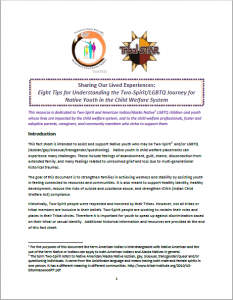 This fact sheet is intended to assist and support Native youth who may be Two-Spirit and/or LGBTQ (lesbian/ gay/ bisexual/ transgender/ questioning). Native youth in child welfare placements can experience many challenges, including feelings of abandonment, guilt, shame, disconnection from extended family, and many feelings related to unresolved grief and loss due to multi-generational historical traumas.
This fact sheet is intended to assist and support Native youth who may be Two-Spirit and/or LGBTQ (lesbian/ gay/ bisexual/ transgender/ questioning). Native youth in child welfare placements can experience many challenges, including feelings of abandonment, guilt, shame, disconnection from extended family, and many feelings related to unresolved grief and loss due to multi-generational historical traumas.
The goal of this document is to strengthen families in achieving wellness and stability by assisting youth in feeling connected to resources and communities. It is also meant to support healthy identity, healthy development, reduce the risks of suicide and substance abuse, and strengthen ICWA (Indian Child Welfare Act) compliance.
Supporting Your LGBTQ Youth: A Guide for Foster Parents
This guide is designed to improve foster parents’ skills in supporting LGBTQ youth in the child welfare system. The guide emphasizes the unique role that foster parents can play in reducing risks and stigma while improving youths’ health and well-being in the community.
Child Welfare Information Gateway
Walking in Two Worlds: Supporting the Two Spirit and Native LGBTQ Community
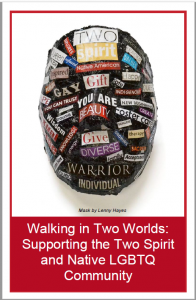 Created by the MN Indian Women’s Sexual Assault Coalition with the assistance of Lenny Hayes as a consultant, this educational booklet aims to educate and bring awareness of the issues that impact Two-Spirit/Native LGBTQ individuals and community for tribal communities, individuals, organizations, and the overall LGBTQ community. This booklet was designed to also help other populations get a basic understanding of the term Two-Spirit, what it means to individuals who identify, and to understand the impact of violence of all forms on this population.
Created by the MN Indian Women’s Sexual Assault Coalition with the assistance of Lenny Hayes as a consultant, this educational booklet aims to educate and bring awareness of the issues that impact Two-Spirit/Native LGBTQ individuals and community for tribal communities, individuals, organizations, and the overall LGBTQ community. This booklet was designed to also help other populations get a basic understanding of the term Two-Spirit, what it means to individuals who identify, and to understand the impact of violence of all forms on this population.
To print this booklet you must first contact MIWSAC for permission. Contact information is at the end of the booklet.
